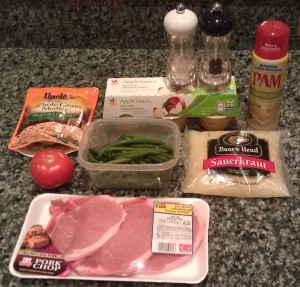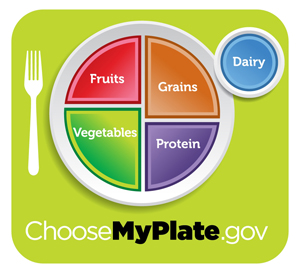How Can I Get My Kids To Eat Healthy Food? More Q&As From The Boys & Girls Clubs
 I’ve continued to have terrific email questions and answers with the Boys & Girls Clubs’ Fit Family Challenge participants. I thought I’d publish some of our conversations so that you can participate as well. The Lang family shared this image of their son eating dinner next to the latest USDA dietary recommendations “MyPlate” materials. A picture’s worth 1000 words, isn’t it?
I’ve continued to have terrific email questions and answers with the Boys & Girls Clubs’ Fit Family Challenge participants. I thought I’d publish some of our conversations so that you can participate as well. The Lang family shared this image of their son eating dinner next to the latest USDA dietary recommendations “MyPlate” materials. A picture’s worth 1000 words, isn’t it?
This cute fella is a healthy weight, he is very athletic, and he’s also wondering where chicken nuggets, french fries, and pizza fit in to the MyPlate dinner plans… His mom asked me how to make more “kid friendly” healthy meals. Perhaps some folks reading this have some success stories that they’d like to share? Here’s what I had to say to the Langs and others…
1. My son doesn’t think the MyPlate suggested meals are kid friendly. What can we do?
I wonder if your son would be open to trying healthier variations of the foods he likes? You could make a pretty tasty pizza with whole wheat crust, grilled veggies, a little pesto or tomato sauce and some ham cubes (ham is much lower in fat than sausage or pepperoni) and low fat shredded mozzarella. You can get a pizza stone to help crisp the crust in a regular oven. The pizza would probably reheat well so you could make it in advance too.You can bread chicken strips and bake them (instead of frying them) to simulate healthy chicken “nuggets.” Same for fish sticks. You can try sweet potato fries for a healthier fry option – bake them in the oven with a little olive oil, salt and pepper. More nutritious, kid-friendly recipes may be found at KidsHealth.org
2. Do my kids need 8 cups of water a day?
As far as water is concerned, the amount you need really depends on how much liquid you’re getting from other sources (food, beverages) as well as how much you’re sweating (exercise), how hot/dry the environment is and how much you weigh. Eight cups/day is a very rough rule of thumb. Some people need more or less depending on the day. Unless you are doing extreme exercise (in the heat) that requires fluid replacement before you notice that you’re thirsty, thirst is a good indicator of whether or not you need to drink. Also, I’ll tell you a doctor secret – all you need to know about hydration is in your urine color. Urine becomes very concentrated (dark yellow) when you are dehydrated. If you drink enough water to keep your urine a nice light yellow, then that’s all you need.
3. What are the best vegan protein substitutes for meat?
Concentrated vegetable protein is primarily derived from soy (tofu and tempeh) and wheat (seitan). Nuts and seeds also contain some degree of protein, as well as beans, lentils, and rice. Tofu, tempeh, and seitan can be molded into burger and hotdog shapes and may be prepared to mimic meat flavors. Keep in mind that concentrated soy or wheat proteins may not agree with your intestinal tract (some complain of excessive gas and bloating). So if you have those reactions, at least you’ll know that it’s quite common.
4. Is it healthy to be a vegetarian? Is there such a thing as too much fruit and veggies?
Vegetarianism can be healthy, though it takes some effort to ensure that adequate amounts of nutrients are received – especially if you’re vegan (no dairy, no eggs). The most common deficiencies for vegans are iron, B12, calcium, Omega-3 fatty acids, protein, and Vitamin D. (You can read more about how vegetarians can overcome these deficiencies here.) I guess my main concern with veganism is the low omega-3s. It is basically impossible to get enough omega-3 fatty acids from plant sources (certain seeds, you may have heard, have a good amount of omega-3 fatty acids but what they won’t tell you is that plant omega-3’s aren’t processed by the body so they remain inactive and don’t provide much benefit.) Omega 3 fatty acids form a protective layer on the outside of cell membranes by reducing inflammation. This is particularly helpful in the reduction of plaque build up in heart arteries, and reducing the risk of various dementias (such as Alzheimer’s) that have an inflammatory cause.
Excellent sources of omega 3 fatty acids are oily fish (sardines, salmon, mackerel, sea bass). This is why the American Heart Association (and MyPlate.gov) recommend 2 servings of oily fish/week for optimal health. Vegetarians are missing out on this important benefit.
As far as eating too many fruits/veggies is concerned – I can’t think of too many potential harms from eating large amounts of fruits/veggies (other than weight gain if you really eat a lot of fruit – they have quite a bit of natural sugar). The real harm comes from excluding vital nutrients by eating plants exclusively (without a careful strategy to get the right plant sources of vitamins and minerals, along with omega-3 supplements).


 In my recent phone chat with the Boys & Girls Clubs participants of the
In my recent phone chat with the Boys & Girls Clubs participants of the  As I’ve been coaching the families in the Boys & Girls Clubs’
As I’ve been coaching the families in the Boys & Girls Clubs’ 







